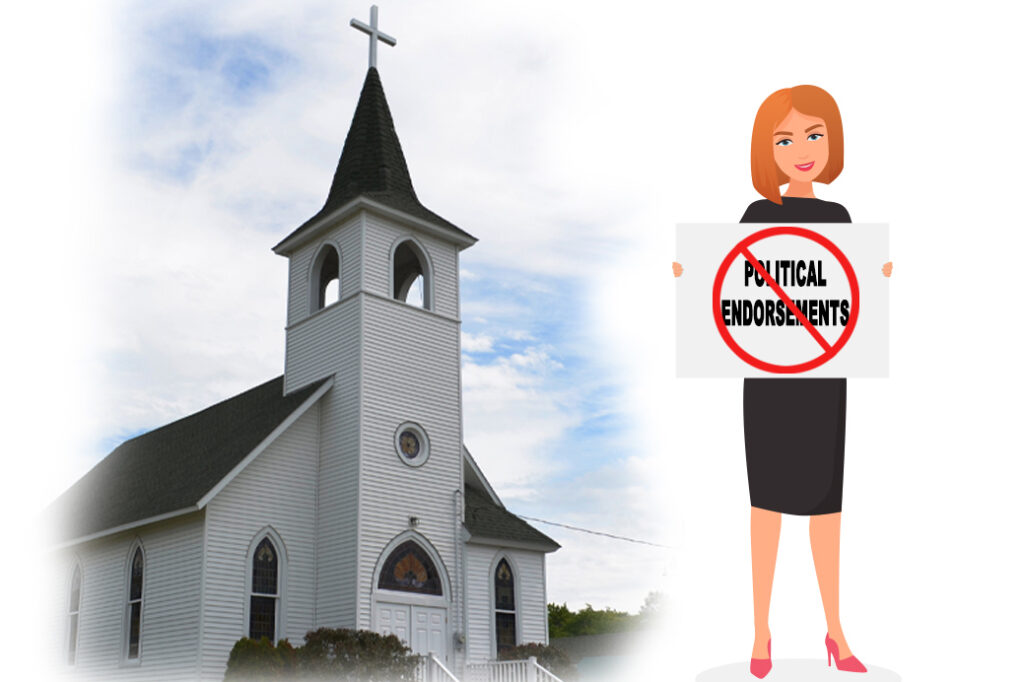On candidate endorsements from nonprofits and the IRS

When Ryan Chamberlin, a Republican candidate in the March 7 special election for the vacant State House District 24 seat, announced last week that he had launched “one of the largest faith coalitions in Marion County’s political history,” presumably he intended to convey that he’d have a lot of spiritual advisors if elected.
We could look past Chamberlin’s hyperbole and be happy for him. After all, Proverbs says, “In a multitude of counselors, there is safety.” So, good for him.
But then another email arrived, this one signed by 20 pastors who insist that Chamberlin is the only candidate for the job.
Cue the flashing red lights.
Although the IRS has been lax in recent years enforcing this rule against churches, it can do so. As an aside, the juxtaposition of the pastors’ disregard for this rule and Chamberlin’s campaign promises to fight against the Biden administration’s so-called “weaponization of the IRS” drips with irony.
In a white paper published on the IRS website offering clarification on these rules, the question is asked- is the prohibition on nonprofits participating in elections absolute? The answer:
Yes, the prohibition is absolute. In United States v. Dykema, 666 F.2d 1096, 1101 (7th Cir. 1981), the Seventh Circuit stated: “It should be noted that exemption is lost . . . by participation in any political campaign on behalf of any candidate for public office. It need not form a substantial part of the organization’s activities.” The Second Circuit agreed with this position when it held that an organization did not qualify as an IRC 501(c)(3) organization because it rated judicial candidates as a very minor part of its total activities. Association of the Bar of the City of New York v. Commissioner, 858 F.2d 876 (2d Cir. 1988), cert. denied, 490 U.S. 1030 (1989). The court rejected the organization’s contention that the substantiality requirement from the lobbying activity limitations be applied to the political campaign activity prohibition. Citing United States v. Naftalin, 441 U.S. 768, 773 (1979), the court stated: “The short answer [to this argument] is that Congress did not write the statute that way.” Id. at 881. The court noted that the IRC 501(c)(3) prohibition against participation or intervention in political campaigns was added some twenty years after the statutory restriction on lobbying. Therefore, the court concluded: “Had Congress intended the added exception to apply only to those organizations that devote a substantial part of their activity to participate in political campaigns, it easily could have said so. It did not.” Id. at 881. Furthermore, the court noted, both houses of Congress, in their Committee Reports on the Tax Reform Act of 1969, explicitly differentiated the scope of the two proscriptions: “[A]lthough the present provisions of section 501(c)(3) permit some degree of influencing legislation by a section 501(c)(3) organization, it provides that no degree of support for an individual’s candidacy is permitted.”
What are the consequences of nonprofits breaking this rule? In Branch Ministries v. Rossotti, 211 F.3d 137 (D.C. Cir. 2000), the court affirmed the revocation of the IRC 501(c)(3) status of a church after it published advertisements in newspapers urging people not to vote for then presidential-candidate Bill Clinton.
When nonprofits go so far as to make financial expenditures for prohibited political activities, it can also come with financial consequences not just against the organization but the managers and directors of the organization.
Can churches host forums and encourage voting? Yes, so long as they walk the fine line of presenting information as an educational measure and not in the role of advocate.
The IRS says that caution must be exercised, and recommends that 501(c)(3) organizations hosting should state explicitly that it “does not support or oppose the candidate when the candidate is introduced and in any communications concerning the candidate’s attendance at the event.” Also, there must be no political fundraising at the event.
Other factors the IRS considers are:
(A) Whether all legally qualified candidates were invited;
(B) Whether questions for the candidate were prepared and presented by an independent, nonpartisan panel;
(C) Whether the topics discussed by the candidates covered a broad range of issues of interest to the public;
(D) Whether each candidate was given an equal opportunity to present his or her views on the issues discussed; and
(E) Whether a moderator commented on the questions or otherwise made comments that implied approval or disapproval of any of the candidates.
The clear conclusion is that Chamberlin’s “historic” coalition of supportive clergy exists because everyone else is dutifully following the law.
Pastors who sent email endorsing Chamberlin
Pastor Daniel Autrey – Souls Harbor Dunnellon
Pastor Anthony Ballestero – New Destiny Worship Center
Pastor Timothy Bass- Life Tabernacle – Ocala
Pastor Joey Campetella – Christian Life Center
Pastor Ishmael Castillo – Marion County Puerto De Almas
Pastor Ryan Crossley – Iglesia De La Roca
Pastor Donnie Ellis – Souls Harbor Dade City
Pastor David Elms – Cathedral of Pentecost
Pastor Joe Guinta – Hope Center
Pastor Rodney Holmes – Mt Carmel Baptist Church
Pastor Brian Kinsey – First Pentecostal Church of Pensacola
Doug Klinedinst – International Evangelist
Pastor Rocki McKinley – Destiny Community Church
Pastor John Moody – Southern Baptist Minister of 60 years
Andy Simpson, Th.D. – Chief Operating Officer, Macedonia Baptist College
Ronnie Simpson, Ph.D. – Pastor, Bright Light Baptist Church
Pastor Rick Sears – Apostolics of Arcadia
Pastor Aaron Sizemore – Cornerstone Church – Ocala
Bishop James E. Varnum – District Secretary for the United Pentecostal Church, 50 years in ministry
Pastor Jason E. Varnum – Souls Harbor First Pentecostal Church
Pastor Rodney Wicker – Kanai United Pentecostal Church





